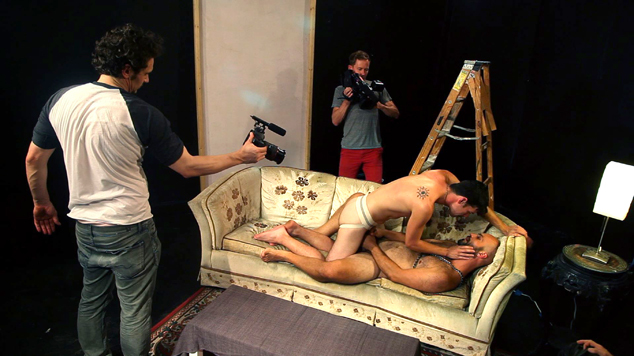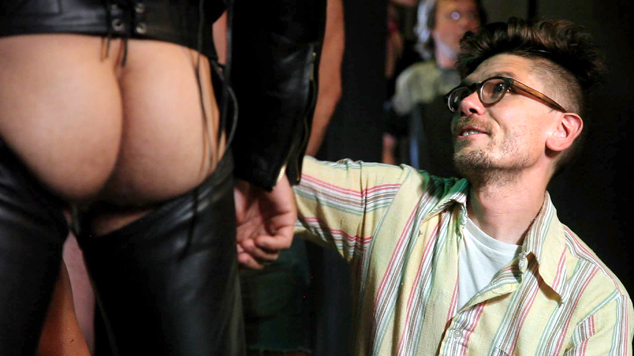 Earlier this year Travis Mathews debut feature ‘I Want Your Love’ was deemed too explicit to be seen by Australian audiences. Many people wondered if the docu-fiction film ‘Interior. Leather Bar.’ that Mathews made alongside actor James Franco, would make it past Australia’s censors either.
Earlier this year Travis Mathews debut feature ‘I Want Your Love’ was deemed too explicit to be seen by Australian audiences. Many people wondered if the docu-fiction film ‘Interior. Leather Bar.’ that Mathews made alongside actor James Franco, would make it past Australia’s censors either.
The film has been accepted by censors and screens this month in Perth. ‘Interior. Leather. Bar.’ takes its inspiration from the 1980 film ‘Cruising’. William Friedken’s film that starred Al Pacino and focussed on an undercover cop who searched for a killer though New York’s gay leather bars. Filmed on the brink of the AIDS breakout, it’s been a long standing Hollywood rumour that Friedken had to cut 40 minutes out of the film to get it past censors.
Franco and Mathews’ film takes this legendary lost footage as their springboard for a discussion about censorship, real sex on film and where our moral boundaries lie. Their docu-fiction film is a film – about making a film – about the lsost part of another film. As the dual directors go about reimagining the mythical lost 40 minutes, we see how their cast handle the challenges of the confronting material and real sex on film.
Travis Mathews spoke to OUTinPerth from his home in San Francisco.
‘Interior. Leather Bar.’ is screening as part of the Perth International Film festival this month, how has the film been received in different places it’s travelled to so far?
You know it’s been quite a journey. A lot of the way in which the film has been received has to do with the way it’s been talked about, in terms of people’s perceptions going into the film.
Initially when we were in production last summer I think there was an initial conversation that seemed as if we were remaking ‘Cruising’ and then that shifted when it became known we were working with these ‘reimagined’ 40 minutes.
I think, increasingly, as we’ve been screening the film, the discussion has become more accurate in terms of – “yes we’re using this 40 minutes as a spring board to see all of these other things”, but it’s very much a docu-fiction that involves all of these other things and it’s not just the 40 minutes.
As a director, it’s quite a challenging area to work in, how do you get actors to feel comfortable with this material?
Well you know I’ve been working with gay men and sexuality and intimacy for a number of years now, so filming ‘Interior. Leather Bar.’ wasn’t terribly challenging. In terms of the functionality of how it happens it comes down to a lot of basic things like trust and really taking into consideration the performers feedback and making them feel like it’s a collaborative process. I’ve never been cold or detached when I work with people in a general sense, but certainly when sex is involved, I try and make it as intimate and trusting as possible.
Your background is in both film directing and psychology, that’s intriguing, which of those things came first?
They’ve kind of played off each other for 20 years now, back and forth, back and forth. I went to film school very briefly for a semester when I was a very young guy, maybe 18? [This was a time before] video had really been syndicated and crossed the point where it was accessible to make movies so I left that and I went to graduate school to become a psychologist.
In the process, the camera became far more accessible when I was realising ‘I think I probably would have been a terrible therapist.’
In a lot of ways my training there definitely helped me and sort of honed my skills as a director especially with the content I’m interested in exploring. A lot of the times it’s had a sexual component to it, but I think more than that if you look at my work. I think it’s easy to see I’m interested in psychology and people’s interior lives in a raw way.
 People are saying your films are part of the fresh new wave of queer cinema. Obviously you’re a gay man, a lot of gay cinema we watch is quite painful, what is it that makes interesting gay stories?
People are saying your films are part of the fresh new wave of queer cinema. Obviously you’re a gay man, a lot of gay cinema we watch is quite painful, what is it that makes interesting gay stories?
I think we’re in an interesting time where we as film makers and as story tellers, and also just the social coin, all of that has matured and diversified in so many splendid directions so we’re no longer confined to telling three or four gay tropes.
Once we were left in the 70’s and 80’s having to tell stories about gay people being seen as victims or villains. There only seemed to be a handful of stories that seemed to be allowed to be told, like coming out stories or AIDS stories or gay marriage.
Obviously there are huge exceptions I’m not talking about, but that period was relatively short-lived and it really sky rocketed a lot of great film makers. Then after that it sort of waned in the late 90s into the first decade of the 2000s.
It seemed to lean in a very sexless commercial cheesy direction or sexy ‘West Hollywood’ kind of thing. That felt really devoid of anything that related to me. It is kind of the reason I started making films to begin with.
I think where we are now, which is exciting for me, is there are a lot of the films coming out soon from gay and lesbian film makers are very much gay films, but they’re just good dramas.
Your first feature ‘I Want Your Love’ was surprisingly denied permission to be screened in Australia. How frustrating was that for you as a film maker that it isn’t allowed to be seen?
Well, it isn’t terribly shocking to me because I was already aware of the classification system there. When I heard about it, the first feeling is it’s disappointing. It’s discouraging that the classification system is working in such a backward way.
I didn’t think; that if we made enough noise that they were going to overturn the ruling or anything. I did think that if we made enough noise and it gained publicity that it might be one step towards them eventually revisiting how they deal with their classification system in the first place.
That is part of the reason why I asked James [Franco] to do the little YouTube video that he did. It also just made sense for him to hone in on it because ‘Interior. Leather Bar.’ deals with boundaries and censorship, to me that is the core of the movie. It made so much sense for him to have commentary on it. I was also just pleased when ‘I Want Your Love’ was pulled that we were able to say “okay, well fine, we have this other film here that continues to deal with this issue”.
It’s almost like you became part of a bigger conversation because, if we talk about boundaries and censorship and we go back ten years ago, we were talking about Larry Clark’s ‘Ken Park’ in the same kind of discussion. It’s almost like here we are ten years later having the same conversation, but with different film makers.
Yeah, it takes it to another level I guess. These things happen and it’s two steps forward and one step back. I hope that it’s working towards making some changes. I’m not there in Australia and I don’t have intimate knowledge of how the film classification works, but people have told me that there are going to be some dramatic changes.
It baffles me because ‘I Want Your Love’ has never encountered the threat of censorship in any other country, and it’s played in some places where you would maybe find it shocking that it’s happened there… It’s surprising that the classification doesn’t make sense.
You’re based in San Francisco, how much does the city inform your identity in film making and telling your stories?
I love San Francisco. I don’t even think of it as a city. I think of it as people clustered on top of each other and it continues to change. Like so many big metropolises around the world it’s becoming increasingly expensive and harder to live here, but as long as I can I will keep San Francisco as my home base I just feel like I can get a little clarity of mind here and stay away from all of the ridiculousness of Los Angeles.
‘Interior. Leather Bar.’ screens at the Revelation Perth International Film Festival on Friday July 11 at 10pm at Luna Leederville.
Graeme Watson




